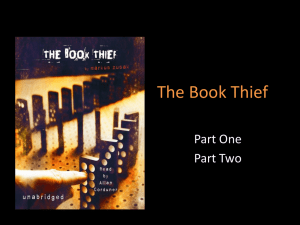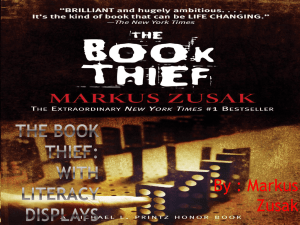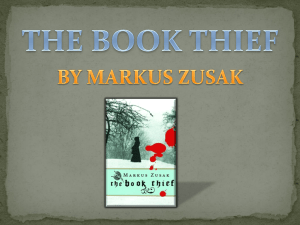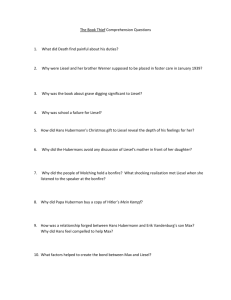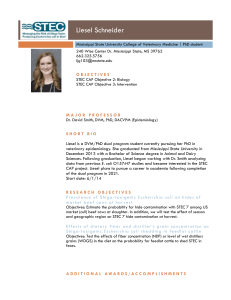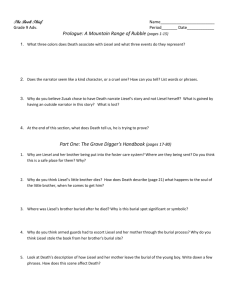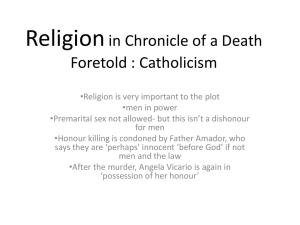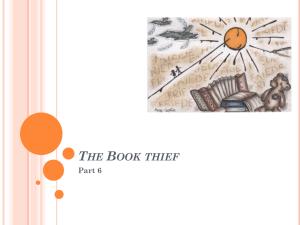TRIMESTER 3: The Book Thief, Importance of Being Earnest, and
advertisement
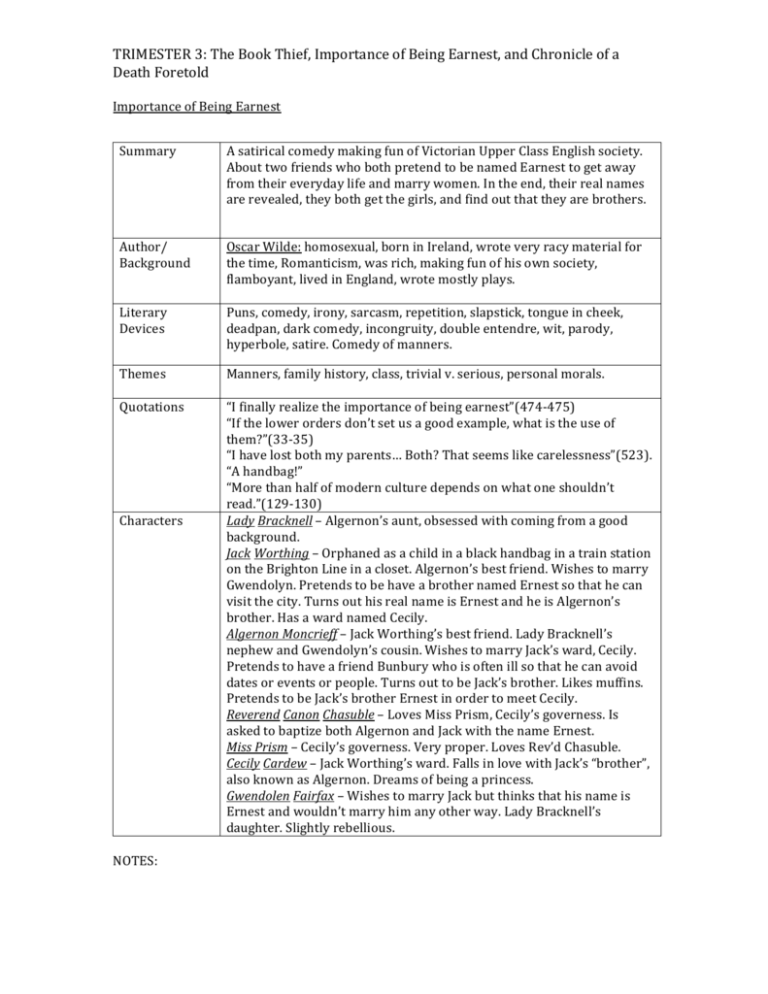
TRIMESTER 3: The Book Thief, Importance of Being Earnest, and Chronicle of a Death Foretold Importance of Being Earnest Summary A satirical comedy making fun of Victorian Upper Class English society. About two friends who both pretend to be named Earnest to get away from their everyday life and marry women. In the end, their real names are revealed, they both get the girls, and find out that they are brothers. Author/ Background Oscar Wilde: homosexual, born in Ireland, wrote very racy material for the time, Romanticism, was rich, making fun of his own society, flamboyant, lived in England, wrote mostly plays. Literary Devices Puns, comedy, irony, sarcasm, repetition, slapstick, tongue in cheek, deadpan, dark comedy, incongruity, double entendre, wit, parody, hyperbole, satire. Comedy of manners. Themes Manners, family history, class, trivial v. serious, personal morals. Quotations “I finally realize the importance of being earnest”(474-­‐475) “If the lower orders don’t set us a good example, what is the use of them?”(33-­‐35) “I have lost both my parents… Both? That seems like carelessness”(523). “A handbag!” “More than half of modern culture depends on what one shouldn’t read.”(129-­‐130) Lady Bracknell – Algernon’s aunt, obsessed with coming from a good background. Jack Worthing – Orphaned as a child in a black handbag in a train station on the Brighton Line in a closet. Algernon’s best friend. Wishes to marry Gwendolyn. Pretends to be have a brother named Ernest so that he can visit the city. Turns out his real name is Ernest and he is Algernon’s brother. Has a ward named Cecily. Algernon Moncrieff – Jack Worthing’s best friend. Lady Bracknell’s nephew and Gwendolyn’s cousin. Wishes to marry Jack’s ward, Cecily. Pretends to have a friend Bunbury who is often ill so that he can avoid dates or events or people. Turns out to be Jack’s brother. Likes muffins. Pretends to be Jack’s brother Ernest in order to meet Cecily. Reverend Canon Chasuble – Loves Miss Prism, Cecily’s governess. Is asked to baptize both Algernon and Jack with the name Ernest. Miss Prism – Cecily’s governess. Very proper. Loves Rev’d Chasuble. Cecily Cardew – Jack Worthing’s ward. Falls in love with Jack’s “brother”, also known as Algernon. Dreams of being a princess. Gwendolen Fairfax – Wishes to marry Jack but thinks that his name is Ernest and wouldn’t marry him any other way. Lady Bracknell’s daughter. Slightly rebellious. Characters NOTES: TRIMESTER 3: The Book Thief, Importance of Being Earnest, and Chronicle of a Death Foretold Laughter: a means of social correction. 1. We laugh at people’s faults-­‐only trifling faults (faults would have to come from unsocialibility instead of immorality) 2. The traits/person must not arouse sympathy or emotion by “isolating” the fault from the whole person (rigidity) 3. We concentrate our attention on gestures rather than emotions. The Book Thief Summary The story is narrated by Death who tells the story of Liesel Meminger, an orphan German girl living in Nazi Germany with her foster parents. Death sees Leisel four times. The family, Hubermanns, that Liesel is staying with takes in a Jew and hides him in their basement. Death tells the reader the end of the book at the beginning of the story. Liesel discovers the power of words and the effect words can have on people. Death contemplates the human species. Max, the Jew, is finally captured. Liesel and her best friend Rudy have a lot of adventures throughout the book. Everyone in her town dies due to an air raid except she doesn’t die. Death later comes to collect her and shows her the book she wrote as a little girl. Author/ Background Markus Zusak: Australian, in mid-­‐30s, Germanic descent, was inspired to write The Book Thief by his grandparents’ stories when they were Germans in Nazi Germany. Not geared towards a specific audience. Literary Devices Circularity, synesthesia, narrated by Death, dramatic irony, circular plot, books within a book, metatextuality, allegory. Death, innocence, power of words, synesthesia, relationships, foreshadowing, horror of humanity, good v. bad, circularity, existence v. contentment “I am haunted by humans.” (550) “Silence was not quiet or calm and was not peace.”(398) “If nothing else the old man would die like a human. Me? Not so sure if that’s a good thing.”(395) “Tears welled up in his eyes as Rudy wondered. A new future? Like him.”(414) “My heart is so tired.” “She returned to bed and fell asleep to the vision of Mama and the silent music”(429) “I want to kill the Führer.”(425) Liesel Meminger – German girl. Main character in the story. Has a best friend named Rudy and befriends the Jew in her basement named Max. Realizes the power of words and their effect on people. Reads to people during the air raids. Foster child taken in by the Hubermanns. Papa teaches her to read in the dead of night. The book thief. Death – Narrator of the book. Contemplates the good and bad of humans Themes Quotes Characters TRIMESTER 3: The Book Thief, Importance of Being Earnest, and Chronicle of a Death Foretold Characters NOTES: Death Be Not Proud Liesel Meminger – German girl. Main character in the story. Has a best friend named Rudy and befriends the Jew in her basement named Max. Realizes the power of words and their effect on people. Reads to people during the air raids. Foster child taken in by the Hubermanns. Papa teaches her to read in the dead of night. The book thief. Death – Narrator of the book. Contemplates the good and bad of humans and the human race as a whole. Notices colors. Collects souls. Metaphysical. Max Vandenburg – The Jew hiding in the Hubermann’s basement. Is saved by Hitler’s Mein Kampf. Friends with Liesel. Writes two books for Liesel while in the basement. Leaves the Hubermann’s and is caught by the Nazis. Survives the Holocaust. Hans Hubermann – Liesel’s papa. Escaped death twice. Dies in an air raid. Was in WWI and WWII. A good man. Doesn’t support the Nazi Party, however he tries to become a member to keep those he loves safe. Loves Liesel. Makes two mistakes. Rosa Hubermann – Liesel’s mama. A hard woman but then on the inside is softer. Good in crises. Rudy Steiner – Liesel’s best friend. Idolizes Jesse Owens. In Hitler Youth. Dies in air raid. Loves Liesel and wants a kiss. Likes to steal food. Ilsa Hermann – Mayor’s wife. Son died in WWI. Creates a relationship with Liesel through books. Is a client of Liesel’s mother’s laundry business but then has to fire Mama because of cutbacks. Takes Liesel into her home after Rosa and Hans are killed. Werner Meminger – Liesel’s dead younger brother. Tommy Muller – ½ deaf classmate. Gets people in trouble. In Hitler Youth. Frau Holtzapfel – Neighbor woman that Liesel reads to. Both sons die. Mama and Holtzapfel do not get along. Hans Junior – the Hubermann son. Nazi. Adolf Hitler – Führer. Dictator of Germany and leader of Nazi Party. Poem written by John Dunn saying that there isn’t anything really special about death. Death is a slave. Dunn pities Death. TRIMESTER 3: The Book Thief, Importance of Being Earnest, and Chronicle of a Death Foretold Chronicle of a Death Foretold Summary Author/ Background Literary Devices Themes Quotes Santiago Nasar is killed at his doorstep because he is accused of taking a new wife’s virginity before she was married. The story is told the day after Angela Vicario and Bayardo San Román’s wedding. Angela’s brothers kill Nasar to protect their sister’s honor. Story is told by an unknown narrator who is a native to the town but investigates the murder some time later. Everyone wants to warn Nasar that the Vicarios are going to kill him, but no one really ends up telling him until it is too late. The Vicarios are arrested. In reality Nasar never had sex with Angela Vicario and she won’t say who actually took her virginity. Bayardo realizes that she is not a virgin when they consummate their marriage. Bayardo throws her out of his house, but later she rights him tons and tons of letters and finally he comes back a changed man. Gabriel García Marquez: Columbian. Raised by grandparents who influenced his writing. Uses Magical Realism. Was a journalist before writing novels and was influenced by Wolf and Faulkner. Is friends with Castro and has socialist ideas. Has spoken out about US imperialism. Best known for his novels 100 Years of Solitude and Love in the Time of Cholera. Chronicle of a Death Foretold: Recreates a murder in 1951 when a Med student was cut down by a man with a machete at his front door. Magical Realism (fantastical elements in reality/everyday life), mystery qualities, pseudo-­‐journalism (tells facts, withholds judgement), not chronological, shows how the memory works Honor, gender relations, societal class, weather, crime and how people react to it. “A falcon who chases a warlike crane can only hope for a life of pain.”(65) “The pursuit of love is like falconry”. Gender Relations Quotes: “The brothers were brought up to be men. The girls had been reared to get married”.(31) “Any man will be happy with them because they’ve been raised to suffer” (31). “Love can be learned”. (35) Honor Quotes: “It was a matter of honor.” (49) “There had never been a death more foretold.” (50) “It’s to spare those boys from the horrible duty that’s fallen on them.” (57) “Honor doesn’t wait.” (62) “At that moment they were comforted by the honor of having done their duty.” (79) “Honor is love.”(97) TRIMESTER 3: The Book Thief, Importance of Being Earnest, and Chronicle of a Death Foretold Characters Santiago Nasar – Killed the day after the wedding. Accused of taking Angela Vicario’s virginity. Angela Vicario – dishonored bride. Was supposed to be married to Bayardo San Roman, but he took her back after realizing that she wasn’t a virgin. Pedro Vicario – the serious twin. It is his idea to kill Santiago Nasar. Was in the army and after prison he joins the army once again. Angela’s brother. Pablo Vicario – The twin that is the decider, meaning he is the one that persuades his brother to go through with the crime. Marries Prudencia Cotes. Angela’s brother. Bayardo San Roman – Man who marries Angela Vicario. Very wealthy. Described as a fairy. Later he gets fat and ages. Purisima del Carmen – Angela’s mother. Beats Angela after she is brought home. Poncio Vicario – Angela’s father. Placida Linero – Santiago’s mother and an interpreter of dreams. Maria Cervantes – “Makes the boys into men” Prudencia Cotes – Pablo’s fiancé. Ibrahim Nasar – Santi’s father.He’s an Arab. Taught Santi about guns and falconry. Victoria Guzman – Nasar cook. Clothilde Armenta – owner of the milk shop where Vicarios wait to kill Santi. Don Rogelio de la Flor – Clothilde’s husband. Divina Flor – Victoria Guzman’s daughter. Santi is infatuated with her but Victoria does not allow Santi to do anything with her. Margot – Narrator’s sister. Cristo Bedoya – A friend of the narrator’s and of Santi. Tries to find Santi to warn him. Luis Enrique – Narrator’s younger brother. Friends with Santi. Father Amador – priest that forgets to warn Santi about the plot. Lazaro Aponte – the colonel that checks on his dominoe game rather than going to get the Vicario brothers. His act initially causes Santi to die. Yamil Shaium – An Arab man who tells Cristo Bedoya about the plan to kill Santiago. Flora Miguel – Santiago’s fiancé. Nahir Miguel – the father of Flora, he finally warns Santiago about the plot to kill him. Xius – A widower who is almost forced to sell the house to Bayardo. Mercedes Barcha – Narrator’s wife. (COOL FACT: Mercedes Barcha was actually the name of Marquez’s real wife.)
